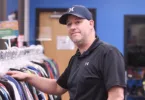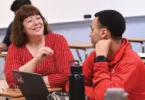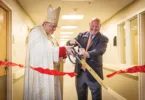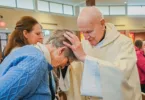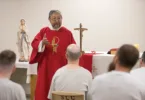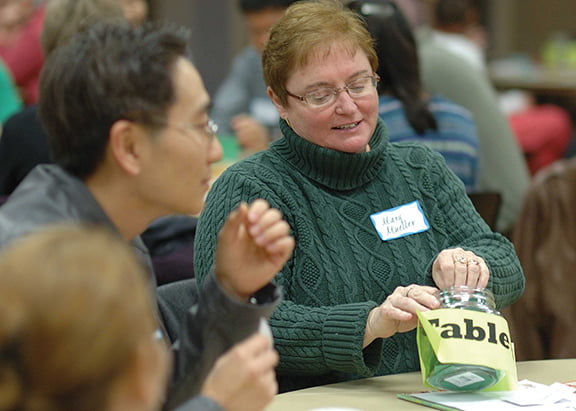
Good Shepherd. Shawnee, parishioner Mary Mueller (right) reads an icebreaker question she’s drawn at the immigration round table as Hoseop Cha, a member of the Korean Catholic Church at Holy Trinity in Lenexa, waits his turn. Photo by Jill Ragar Esfeld.
by Jill Ragar Esfeld
jill.esfeld@theleaven.org
Food, like faith, is a common denominator. Any group, no matter how diverse, enjoys preparing and sharing food.
That’s the philosophy behind regional Immigration Roundtable Workshops — a faith initiative cosponsored by the archdiocesan offices of Hispanic ministry and social justice.
The two-hour workshops seek to bring immigrants and non-immigrants together in different regions of the archdiocese to break down barriers through the common bond of faith and food.
And so far, they’ve been a gastronomical success.
“Food is an automatic icebreaker,” said Father Pat Murphy, CS, who only recently left his position as animator for the archdiocesan Hispanic ministry office. “People always ask, ‘What is that?’ ‘How do you make it?’”
Three parishes sponsored round tables within the last year — Blessed Sacrament in Kansas City, Kan.; Holy Trinity in Lenexa; and Our Lady of Guadalupe in Topeka.
The experience has yielded even more than expected.
“I thought it was a very nice experience,” said Holy Trinity parishioner Martin Figueroa, a native of Mexico, who attended his parish round table.
“I felt,” he continued, “like I was with my family — with Koreans, with Americans, with Salvadorians, with Mexicans mixed in.
“It was a very nice experience to me.”
The Holy Trinity workshop began with participants seated around different tables, each representing an even mix of nationalities.
Each table also had a jar in the middle filled with general questions to share and discuss.
Language was no barrier, as participants helped one another share thoughts and feelings about everything from favorite foods, to what they like about the United States, to how they stay in touch with family and friends back home.
“Normally we would not be together,” said Father Pat. “Yet in five minutes, answering some simple questions, we find out how much we have in common.”
Participants soon discovered that, no matter where they came from, they all had a common faith, hopes for their children, favorite restaurants for native foods, gratitude for being in this country, and pride in their heritage.
And then, of course, there was the most common theme.
“We all like to eat,” said Father Pat.
Each round-table participant brought a native dish to share during the workshop. Once group members had gotten to know each other, participants were invited to fill their plates.
It was a fun and adventurous experience.
“I ate Korean food,” Figueroa announced proudly. “It was very different, but very good.”
While participants enjoyed the assorted foods, they watched a portion of a documentary called “Welcome to Shelbyville.”
The video documents the experience of immigrants working at a meat packing plant in Shelbyville, Tenn., as they struggled to adjust to their new home — and as Shelbyville natives struggled to adjust to their new neighbors.
“The entire movie is quite well done,” said Father Pat. “I wanted to use a snippet just to give people a taste of what we’re talking about — of what happens when new people move in and how that affects us.”
After the movie, the group was given questions to encourage discussion at each table.
The resulting conversations were heartfelt, revealing, and often emotional.
“We had different views at our table,” said Mariana Ramirez, a Good Shepherd, Shawnee, parishioner who attended the Holy Trinity round table.
“It was a choice [to come to the United States],” she said. “For some, that choice was more painful. We left family and culture that is still a pain in our heart.”
“There were some tears shed — not necessarily something we planned for,” said Father Pat, “but sometimes the Spirit works in different ways than we imagine.”
Figueroa related to the movie and was inspired by the conversation that followed.
“I learned we can do whatever we want,” he said. “We can do it together.
“We can share whatever we have and give to one another — that’s what I learned.”
After the discussion, representatives from each table shared thoughts . . . and again a common theme emerged — no matter where we are, we are brothers and sisters in the same God. We are one in the body of Christ.
The workshop ended with a prayer from St. Juan Diego, imploring his intercession to help immigrants.
Planners felt the round-table experience served to break down some of the barriers they had targeted. Participants agreed.
“I would like to talk with these people more, just like a friend,” said Figueroa after the workshop. “It’s good.
“I would like to do that more than once a year.”
Obviously, we’re not solving the entire issue of immigration,” said Father Pat. “But we’re beginning a dialogue.”

